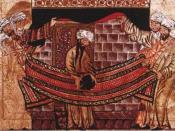The Islamic Faith History. Islam is a monotheistic religion founded on the revelations received by the Prophet Muhammad in 700 CE. Islam, or submission, reveals Islam's central belief of surrendering to God. The Five Pillars by which Islam follows are prayer, faith, fasting, alms, and pilgrimage. In earlier days of settlement in 500 BC, many people chose Mecca as their home because this was the location of the Ka'ba, a shrine devoted to diverse deities. Mecca was filled with spirits, and Gods who were worshiped. The Arab religion focused mainly on worldly life, but not necessarily grounds for ethics; was dualistic, but with a belief in heaven and hell. Around this time, and the time of Muhammad, violence and corruption had filled the city of Mecca. Soon, Christianity and Judaism made an appearance in Mecca, influencing people to monotheism, or belief in one God. This God became Allah, who was "the creator, provider and determiner of human destiny," and "he was capable of inspiring authentic religious feeling and genuine devotion" (Smith, 225).
"It was into this world of sporadic monotheism and rampant immorality that Islam was born." (Religionfacts, 2007) Amongst the religion of Islam, one will find Myths, Texts, and Symbols, of which believers hold very sacred. Today, Islam is the second largest religion in the world; one will also make a clear distinction of similarities and differences to Christianity, which is the largest religion in the world.
Myths in IslamThe Qur'an According to a recent posting on a Danish Web Site by Timothy Duncan, the Islamic Qur'an is considered the "holy book" of the Muslim religion.
"The original texts of most of the former divine Books were lost altogether, and only their translations exist today. The Qur'an, on the other hand, exists exactly as it had been revealed to...



I loved it
It explained me everything about the Islamic religion. It even showed the similarities and differences between Islam and other religions, also how Muslims live their life
2 out of 2 people found this comment useful.